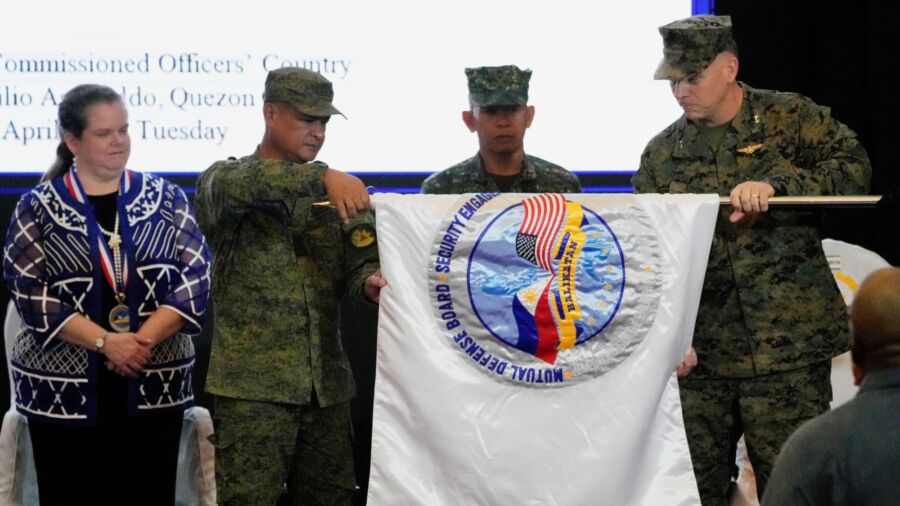The United States and its key ally the Philippines are holding their largest war combat exercises in decades on April 11, with more than 17,600 military members from both countries set to participate in the annual bilateral event in and around the island nation.
The joint exercise, known as the “Balikatan,” will run up to April 28, according to a news release from the U.S. Embassy in the Philippines.
During the drills, approximately 5,400 members of the Armed Forces of the Philippines (AFP) and 12,200 U.S. military personnel will train “shoulder-to-shoulder, developing interoperability and improved capability in the areas of maritime security, amphibious operations, live-fire training, urban and aviation operations, cyber defense, counterterrorism, and humanitarian assistance and disaster relief preparedness,” officials said.
Specifically, this year’s exercise—the 38th iteration of the event—will include a bilateral command post-exercise that will “strengthen the Allies’ ability to plan, coordinate, and provide command and control of forces together against a range of scenarios and simulated challenges.”
According to the embassy, the training will also help enable the AFP and the U.S. military to “refine tactics, techniques, and procedures related to maritime security, and deconflict fires and maneuver in a shared and contested battlespace.”
Military personnel from both nations will also conduct various Humanitarian Civic Assistance (HCA) projects aimed at improving infrastructure, enhancing medical response, and strengthening ties between local communities and Philippine and American military forces.
Such activities as part of the HCA projects include constructing or renovating three community health centers and multipurpose halls as well as training in advanced emergency rescue and lifesaving techniques, the embassy said.
China Issues Warning
The drills come as the Biden administration has been seeking to strengthen alliances across the Indo-Pacific region to better counter the growing threat from China, which has become increasingly aggressive in its actions toward the self-ruled island of Taiwan, which it views as part of its territory that must be united with the mainland.
Tuesday’s drills got underway just after Beijing ended three days of military drills around Taiwan, which included testing integrated military capabilities under actual combat conditions, practicing precision strikes, and blockading the self-ruled island.
Those military drills followed Taiwan’s President Tsai Ing-wen’s meeting in Los Angeles with U.S. House of Representatives Speaker Kevin McCarthy (R-Calif.), which prompted outrage from Beijing.
The latest combat exercises between the United States and the Philippines—which is located in close proximity to Taiwan—risk further exacerbating tensions between Washington and Beijing.
In a statement on Monday, China’s Foreign Ministry spokesperson Wang Wenbin said the joint exercises “must not interfere in South China Sea disputes, still less harm China’s territorial sovereignty, maritime rights and interests and security interests.”
‘Not a Provocation’
In March, Balikatan spokesman Col. Michael Logico told reporters that the exercises are “not a provocation” while noting that the military has the power to conduct such exercises inside its own territory, including its territorial waters.
“Everything that we are doing here is only within our territory. Our exercises are not aggressive. We term our exercise as defenses so we are doing maritime defense, territorial defense, coastal defense,” said Logico.
In a separate statement earlier this month, AFP Spokesperson Colonel Medel Aguilar stressed that the joint exercise serves to enhance both the United States and Philippines’ “tactics, techniques, and procedures across a wide range of military operations,” while simultaneously increasing their ability to “work together effectively and efficiently in response to various crisis situations.”
Philippine President Ferdinand Marcos Jr. has been moving to improve defense ties with the United States since stepping into office after his predecessor scaled back drills to pursue closer ties with Beijing.
In February, he granted Washington increased access to four of his country’s military bases, including three in the north of Luzon Island, the closest bit of land to Taiwan besides China.
Marcos plans to watch the latest live drills, Col. Michael Logico, a Philippine spokesman for Balikatan, told reporters.
Elsewhere, defense and foreign ministers from both the United States and the Philippines are set to meet for the first time in seven years in Washington this week.
Reuters contributed to this report.
From The Epoch Times

